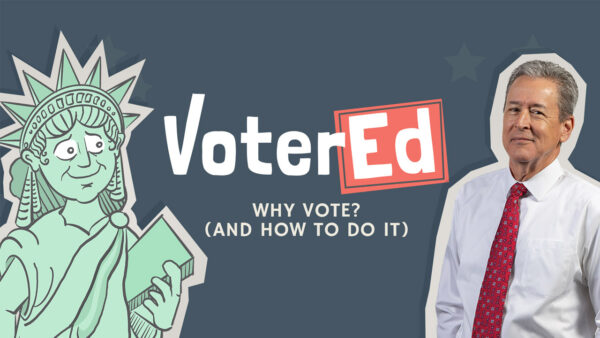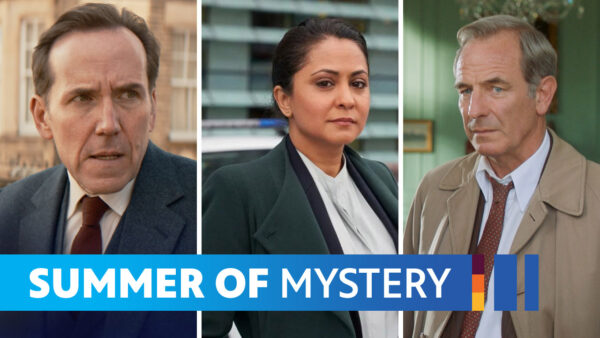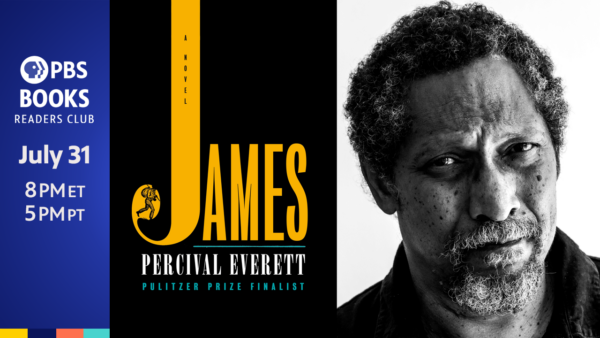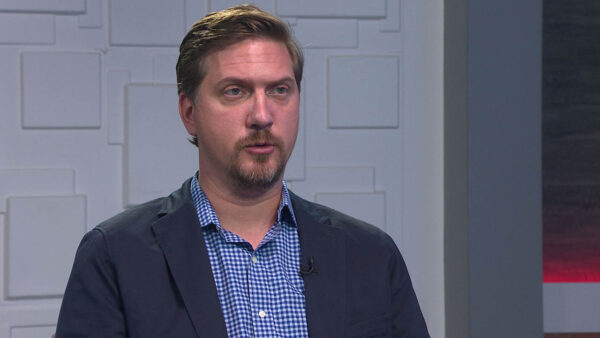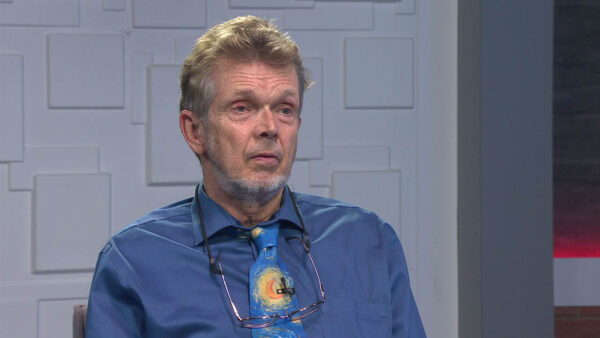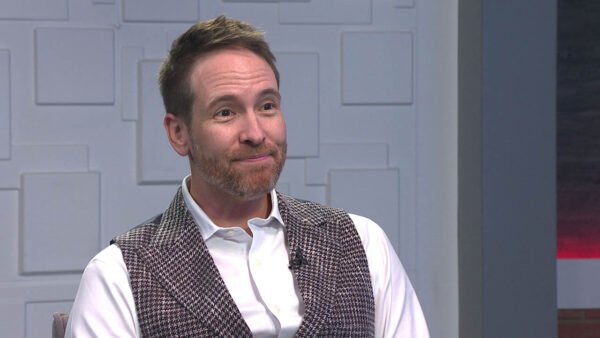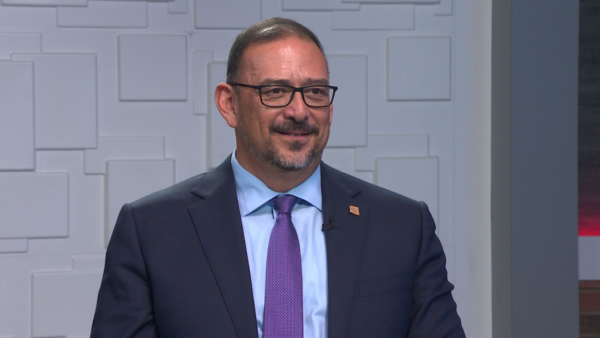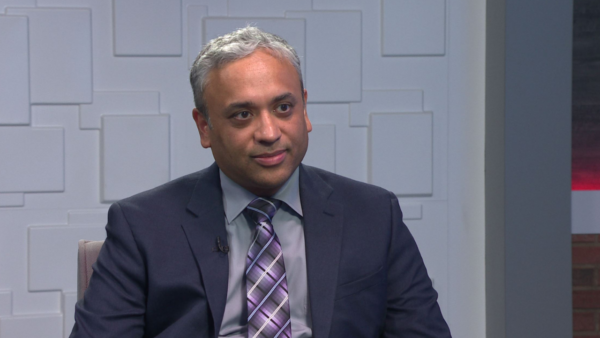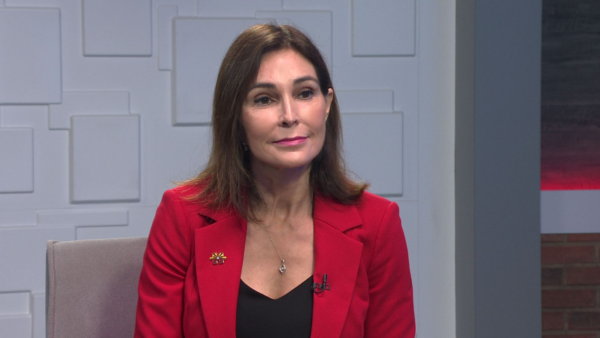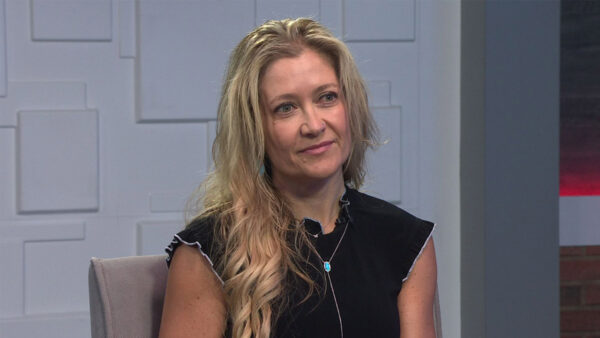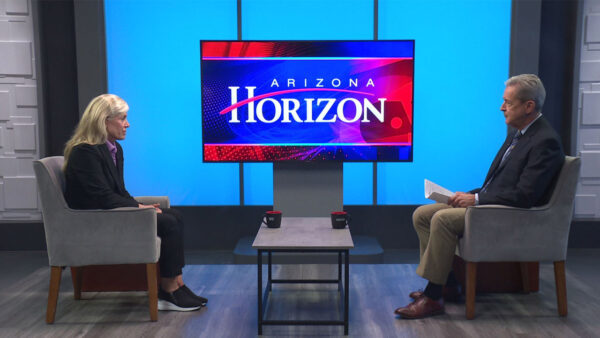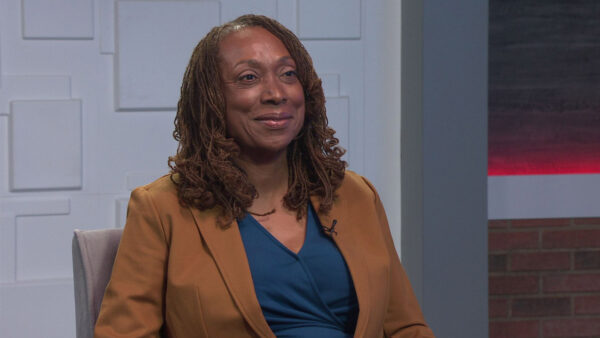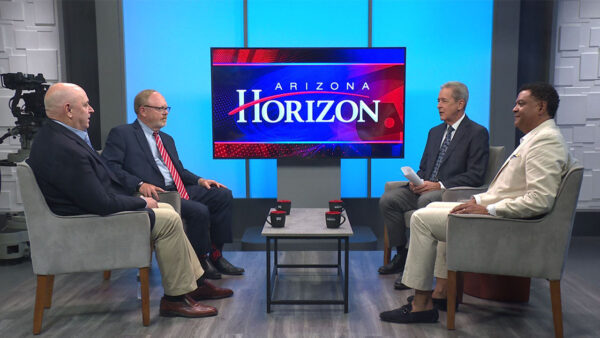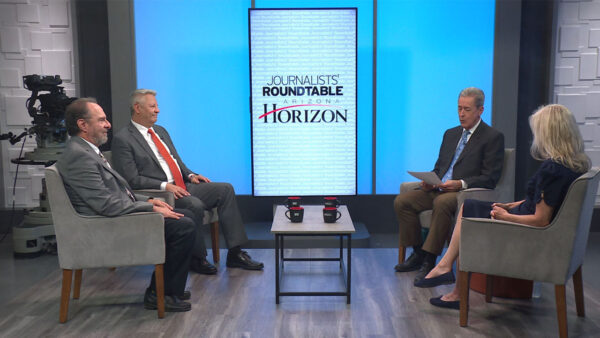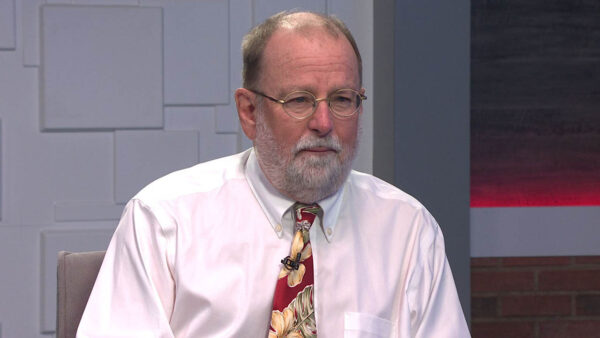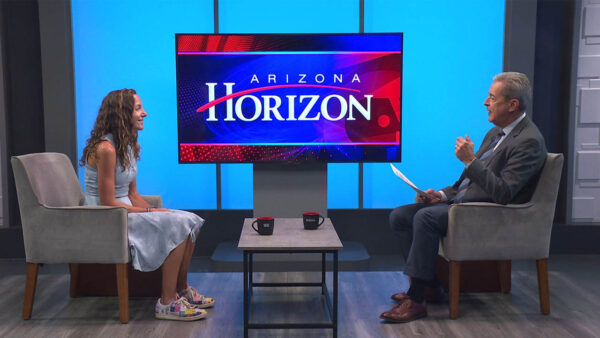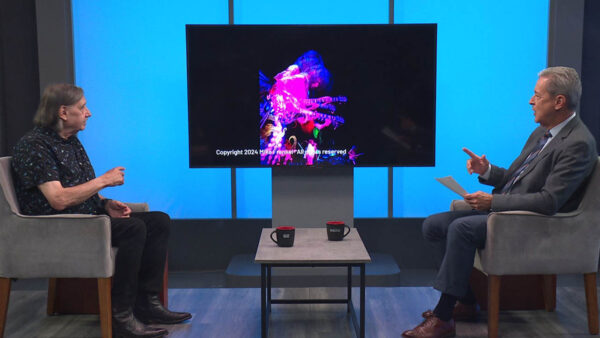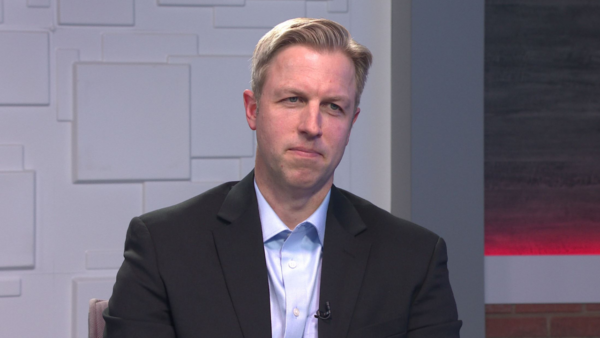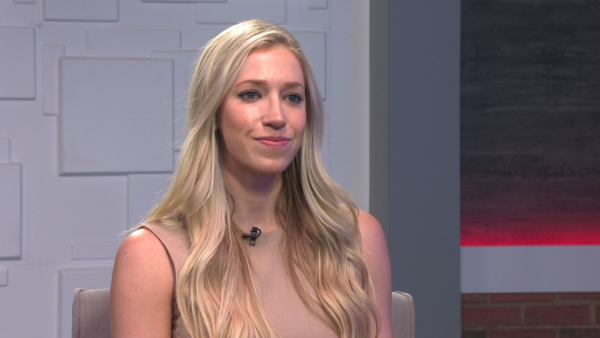Hear from two top-selling authors about their newest works. International bestseller Bill Bryson, author of “A Walk in the Woods, A Short History of Nearly Everything, At Home,” will talk about his latest book, “One Summer: America, 1927.” Thomas Moore, author of the bestselling “Care of the Soul,” will talk about his new book, “A Religion of One’s Own: A Guide to Creating a Personal Spirituality in a Secular World.”
Ted Simons: Coming up next on this special literary edition of "Arizona Horizon," Bill Bryson talks about his celebrated writing career and his latest effort, which chronicles the summer of . And we'll hear from "Care of the soul" author Thomas Moore on his latest work, "A Religion of One's Own." Those stories next on this "Arizona Horizon" literary special.
Narrator: "Arizona Horizon" is made possible by contributions from Arizona friends of . Members of your Arizona PBS station. Thank you.
Ted Simons: Good evening and welcome to this special literary edition of "Arizona Horizon." I'm Ted Simons. Tonight we feature two major best selling writers. Bill Bryson has written a number of enthusiastically received books on travel, history, science, and language. Bryson's latest effort looks at the summer of , a season that seemed to push America into world leadership by way of Charles Lindbergh, Babe Ruth, and motion picture talkies. I spoke with Bill Bryson about his work and the summer of . Bill Bryson, it's good to have you on "Arizona Horizon."
Bill Bryson: I'm delighted to be here. Thank you for having me.
Ted Simons: Thank you so much. I gotta ask you, just for starters, you're a kid from Des Moines, Iowa. How does kid from Des Moines wind up a chancellor of a United Kingdom University?
Bill Bryson: It takes a strange turn. I went to Europe in 1972, hitchhiking around, ended up getting a job at the end of the summer, totally out of the blue, met a girl who's a student nurse at a hospital I was working out, fell for her, fell for England, and that's the rest- That is a long story, but ended up living in England unexpectedly and making my life and career over there.
Ted Simons: When you look back, was there something in the U.S. that was lacking, or was it just --
Bill Bryson: No, no, nothing to do with any rejection of America or anything like that. It was much more of a- Just this new unexpected opportunity came along. I really liked England. I really like still even after these years, I like being a foreigner. It's a privileged position. And it's not hard to live in England. I still come home a lot. America is even though I haven't lived here much for years, it's still home. We were talking about the world series, I'm really just as interested in that kind of thing as I was when I lived here. This is my fifth trip back to America this year. So I'm not really away from the country that much.
Ted Simons: And you're still not a British citizen.
Bill Bryson: No.
Ted Simons: Ever? No plans?
Bill Bryson: Because I'm getting older and because they tell me one of these days at some point I will die, I really ought to get my paperwork in order. And just for inheritance purposes. So at some point I have to. But the problem is they have a really tough test you have to take. And they ask you questions like how many members of Parliament are there. And nobody, British people can't answer that. It's just like how many members of the house of representatives. I don't know. A few hundred. I don't know. Those questions you have to study really hard to pass the test.
Ted Simons: Compare, obviously you've been on both sides of the ocean, you have unique perspective in many respects. Compare culture, curiosity, could you be Bill Bryson if you had never gone to Europe?
Bill Bryson: Well, I would be a different Bill Bryson. I think I'd still- Basically what you see now, I'm sure I would have thinning hair and a pot belly, but it has obviously affected my life a lot by living in another country. It opens a lot of doors for me. I grew up with a strong sense of wanderlust, which I think is the- Growing up in Iowa it seemed to me the rest of the world was a lot more exciting than Iowa. And bright lights were elsewhere. And I wanted to go and see them, experience them. And so when I had a chance to settle in Europe, I thought I was the luckiest guy in the world. And I still kind of feel that way. I still feel privileged to be able to have a life that is kind of rooted in two different countries.
Ted Simons: That wanderlust led to the travel books, which you're very well known for. When you write a travel book and you are wandering, do you write as you wander or do you wait to come home and then write?
Bill Bryson: I take notes a little bit as I wander, but the most of it is done when I come home. It's two too time consuming to do on the road, and it would interfere with having the experiences to gather material. So I do most of the writing after the fact.
Ted Simons: When you leave, like on the Appalachian trail, and you take that particular journey, did you leave knowing I'm going to write about this, or do you believe going, I'm going to take a walk in the woods, maybe I'll write about it.
Bill Bryson: I knew I would write about it, every day I was thinking I don't know how. I don't know how we're going to get a book out of this. Nothing was happening. We were hiking the Appalachian trail, we were leading full days, but just walking. It's the most repetitive activity you can imagine. And for a long time it didn't seem as if we were doing anything interesting, just getting up and walking all day and falling into sleeping bags. I don't know how I'd ever get a book out of this.
Ted Simons: How did you?
Bill Bryson: Partly because the guy I went walking with was a spectacularly eccentric fellow. And he made a big difference. And we started meeting people along the way. Some of them colorful, some of them just did us kindnesses. And the Appalachian trail itself is fantastic. We're so lucky in this country to have the eastern woodlands. You go out there and you're in- Now, right now you're in the same environment as Daniel Boone would have been in. George Washington was riding through. It's like time travel. You going out in the woods and it's just like it was years ago.
Ted Simons: You're a travel writer, you've written memoirs, you've written about science, history. The short history of just about everything, or-
Bill Bryson: Almost write, right.
Ted Simons: "The short history of nearly everything." How does one sit down and say, I'm going to write about almost everything?
Bill Bryson: That was a crazy one. I was wondering at times, what am I doing? What's happening? But it was- The whole idea of that book was that I had always been fascinated by science, but I was terrible at science at school. I thought there's got to be a level at which I can engage without doing all the equations. Because science explains everything, it tells us who we are, how we got here, where we're going, what we need to go if we want to get where we want to go. Science is hugely important to every single thing in our lives. I felt there's got to be some level at which I can interact with.
Ted Simons: With that, I want to get to the writing process. First of all, how do you write? And when you - Like when you're- I want to get to 1927 in a second, your most recent book. But when you write the short history of just about everything, are you writing for someone, do you see that person? Who are you writing for?
Bill Bryson: I try to be conversational. I don't try to be stern and formal. I do try to be as approachable as- Find the voice that makes me sound as friendly and as- I don't want this to be an ordeal, it should be a pleasant experience. So I work hard in trying to get the tone right. Once you get the tone right, if you've got all the information, then it's not so hard. But it is actually quite hard, but the hard part really is getting that kind of first paragraph done and getting the voice right.
Ted Simons: And now the latest book deals with 1927. Why?
Bill Bryson: It's all about the summer of 1927. The summer of 1927 was the most eventful magical summer in any nation has ever had. Certainly in peace time. And it was one thing after another. You had Charles Lindbergh fly the Atlantic, which was hugely joyous event for America, and the world, babe Ruth hit 60 home runs, so it gave me an opportunity to bring a lot of baseball into it. You also had- It was probably the most exciting baseball season ever. You had lots of other things like Sacco and Vanzetti, these anarchist were executed that summer, that was a dark story, but a really big story. They started filming "the jazz singer," the first talking picture. Started carving Mount Rushmore. It was one thing after another. It was just kind of dizzyingly eventful.
Ted Simons: And America leading the way in a fashion that, do you think Americans knew they were leading the way as that was going on?
Bill Bryson: They were just discovering it. America had been unquestionably the richest and most important nation on the planet for some time. At least since the first world war, but probably pretty much the whole of the 20th century. But it didn't have that confidence. It didn't see itself -- It still looked to Europe for leadership. When economic decisions were to be made, it was the governors of the bank of England that made these decisions. America kind of followed. And the summer of 1927 was just the period when it was suddenly discovering itself. It was really- If America were a kid it was like 18 years old and just about to leave home. It was growing up. Just about to burst out on its own. You really see that happening in the years that followed. You think about how America was in World War II, it was our war. Once we entered, we took charge. There was no question Eisenhower would be in charge of the invasion and everything. America had suddenly gotten in a decade really confident. And a lot of the things that happened in the summer of 1927 really gave America that confidence.
Ted Simons: And yet with that confidence, with all of that achievement, way out there in the future is this great depression, just waiting to happen. When you researched and wrote the book, was that future always in mind, or were you just like everyone else in America at the time reveling in the good times?
Bill Bryson: It's a very interesting question. Of course I had advantage over all the people I was writing about, that I didn't know how it turned out. So what I tried to do when I was writing the book was to try and keep locking myself into that summer and pretend I didn't know what was around the corner. Try to imagine what was it like for the people living through that summer. And obviously you can only do that up to a point because I do know what -- How it turns out. I do know the great depression is coming. But I did try to imagine, what was it like not to know the depression was coming, or babe Ruth wouldn't hit 65 home runs the next year. And just to think about these things from their perspective. That was a really interesting exercise for me.
Ted Simons: So with everything that happened, I think the talkies, the motion picture talkies, I think that was in retrospect absolutely huge in a way that America even today exports entertainment, exports film, we exported ourselves with that.
Bill Bryson: The really important thing, it never gets thought about, is once the pictures started talking, once there were voices it was American voices the world was hearing. And that made a huge difference. Suddenly Jimmy Stewart and John Wayne, and America really seemed a lot more important because we were kind of so dominating the culture. There's lots of other stuff that went with it, we dominated popular music, we dominated theater, increasingly dominated literature. But movies is the key. The reason everybody wanted to come to America was Hollywood.
Ted Simons: So was this a fun book to write? Did you enjoy yourself?
Bill Bryson: The time of my life. The most fun I've ever had writing a book.
_________________________________________________________________________________
Ted Simons: Thomas more is perhaps best known for "Care of the soul," a Book that helped readers find and develop the sacred rewards of everyday life. Moore is out with a new book titled "A religion of one's own A guide to creating a personal spirituality in a secular world." In the book, Moore looks at how a sense of purpose can be found and cherished by way of a personal spiritual style, inside or outside a formal religious structure. I spoke to Thomas Moore about his newest work. Thanks so much for joining us.
Thomas Moore: Thank you for having me.
Ted Simons: "A Religion of One's Own," interesting. Explain.
Thomas Moore: It will take a while.
Ted Simons: Yeah.
Thomas Moore: Well, my thought is that when people think of religion, they usually think of an organization to join. You become a member. And you're told what to think and what to believe and, which is fine, but it's -- you're kind of surrendering yourself. And I think that that goes too far, not only that, but times are changing and an awful lot of people don't want to do that anymore. They're turning away from religion. In my book, I wanted to bring people back to religion, but in a different way.
Ted Simons: Interesting. Give me a definition of religion.
Thomas Moore: My definition of religion would be something that we would experience ourselves. For example, a lot of mysterious things that go on in our lives, like, well, like sickness, getting really sick. That is a mysterious thing. It comes on and you don't know where that came from or what to do. Or divorces or, you know, a death in the family. So, those mysteries. My definition is that religion is the creative response to those mysteries that we have to deal with.
Ted Simons: How does that differ from spirituality?
Thomas Moore: It differs in this way, that what I'm trying to do is connect -- I use the word religion because I want to connect this idea of having your own religiousness with the traditions. I want to say that we can learn a great deal. Traditions can be resources for us. So, we don't have to go to them and say I surrender to you. You can say, I really like what you're doing. Can you teach me something? Do you have something that will help? So, it is a different thing. I want to keep the idea of religion there rather than just sort of spirituality as an undefined thing.
Ted Simons: But so many people look at religion, at faith in and of itself as a surrendering, with faith a surrendering of belief or having to see something as proof. Don't you need a little bit of surrender?
Thomas Moore: Absolutely. You do. You need a little bit. We have gone way too far. Religions are beautiful. This is the thing. I, you know, I have a Ph.D. in religion. I have studied religion all of my life. I was a monk. I'm really into religion. I love the religious traditions, all of them. But they have a dark side. They have a side that doesn't work for a lot of people. They tend to be too authoritarian. They're a little bit afraid of the body and sexuality. Gender issues come up. That kind of thing. They want to tell you too much what to do. I'm telling you, I mean, that -- that is not my experience. I hear all of these people are telling me that they just can't go back to the religion that they grew up in because they don't want to get that involved that way. They don't want to give themselves up.
Ted Simons: And traditional religion says that's part of the deal.
Thomas Moore: I know.
Ted Simons: You follow us. We don't change because --
Thomas Moore: I know.
Ted Simons: Because you changed. You have to stick with us.
Thomas Moore: Yeah.
Ted Simons: How do you respond to that?
Thomas Moore: That's fine. Religions want to do that, I think that is important. They are traditions, and they have to be careful to keep their traditions intact because they will just become anything if people just start making things up right and left. I understand that motive. But at the same time that they do that, we, as individuals, I think, have to think for ourselves. I think a lot of people approach religion and understand it from when they were children. A lot of people haven't had much study in this thing or are not terribly sophisticated about religion. And so they -- I think the point is that we can be more adults in our relationship to those traditions.
Ted Simons: I can hear critics saying that religion can't be a buffet like --
Thomas Moore: I know, yes.
Ted Simons: How do you respond to that criticism?
Thomas Moore: I just say that I like buffets. It's fine with me if -- that is a good way to go about it. I have got so much from the different traditions. I could list like right now probably five or six religious traditions that have just transformed me because of what I have taken from them but I never became a member of any of them. So, there is a lot of richness in them. But I agree with -- with the criticism that we can be too superficial and just picking a little bit of this and a little bit of that. But you don't have to do it that way. You can really get into something. You don't have to get a Ph.D. in it, but you can read something, a tradition, or go to another -- learn some prayers in another religion, and it is amazing how it can affect you and not be superficial at all.
Ted Simons: What about the fellowship of being around like-minded believers, if you will?
Thomas Moore: Well, that's important for a lot of people and if that's what -- if that is really important, a person should do that certainly. However, I think that what I spell out here, I spell out how to do your own religion. All of the details. How to do it. And I think if you do it that way, you will still have community, but it will come from the fact that you have done so much yourself that -- that as you go deeper into the nature of what it means to a human being in this world, and what the world is like and developing your values, you will find a community that may be stronger and deeper than the kind you find just going to a building.
Ted Simons: I know that some would say, you write in the book, everything from classical music, flower arranging, reading Hemingway can be part of one's religion, and the subtitle of the book, a guide to creating a personal spirituality in a secular world. Are those things -- some would say that those things are secular. They're not necessarily secular.
Thomas Moore: Not necessarily. When I studied religion, I went to Syracuse University and studied there. We -- a field called religion and literature. We studied poets, Emily Dickinson, writers -- people like that. We saw how -- we studied how they explored some of these questions really deeply with a lot of insight and penetration. So much so that they were equally important or at least they were an important piece to add to the sacred text that you get from the religions. So, it is a way of looking of what we have considered to be secular, to see that there is more to it than that, that the artist, especially, penetrates so deeply that they can supplement our religious understanding.
Ted Simons: When you hear a Glen Gould recording or you go to an art museum and you see a painting or you -- you walk, take a hike in nature, and that feeling, everyone has felt it, can't deny this out there, you felt it, this just -- you call it bliss.
Thomas Moore: Yeah.
Ted Simons: Is that religion? Is that spirituality?
Thomas Moore: In my definition it is. In my definition, it is religion. First of all, it is a practice. You're doing something. And it is a practice that makes sense to you because of the way you have thought it through. That is your theology in a way, how you understand the world and for you, nature may be an important source of your spiritual nurture. For somebody else, like me, Glen Gould does it. But then I look at Glen Gould, his writings, some of the things he reflected on, and he talks about how for him, playing music was a way of touching divinity. And I take that seriously. I don't take it as a mere metaphor. Same with Edgar Mitchell. He goes off as an astronaut to the moon. On his way back he says that he just had a sense of the -- the Unity of everything and how everything is connected. He came back a transformed person. I would call that religion. That was a -- because we don't usually think of it that way, we explain it psychologically or in some other terms.
Ted Simons: Do we use religion too much as a way of rules? Things to follow.
Thomas Moore: Yes.
Ted Simons: And some would say you need rules, you need things to follow. How does that -- how do you work that dynamic?
Thomas Moore: I don't think we need religion for those rules and that kind of guidance as much as we used to. We know so much more. People are more sophisticated than they used to be. We tend not to be sophisticated in religion. If we are, I think we would say, I don't need rules so much as I need some way to raise my kids so that they will be sensitive human beings with a sense of values. How do I do that? That's the religion of that family, let's say, trying to sort that out.
Ted Simons: And if you find that in a cathedral, if you find that in a field of daisies, you found it.
Thomas Moore: You've found it either way. When I started writing this book, I was writing about Henry David Thoreau. He didn't build the cathedral, he built a little cabin and he built it by a pond, by a lake. And for him, that was like a sacred edifice, and he thought of it that way. I thought he was a good model.
Ted Simons: You mention quote the world is ruled by letting things take their course. Letting things take their course. Explain.
Ted Simons: I get that from -- I get that from my study of formal religions, from China, from for example, a wonderful sacred text from China. I read it three or four times a year to keep my own spirituality honed, and, you know, so that spirit, that way of looking at things is there. So, I take that and I say, you know, the Chinese had a really good idea there. I'm going to make it my own. This is going to be one of the principles of my life. Let things take their course. Don't interfere so much. Notice what is happening, go with it. Instead of always fighting because you think you know better. And I think that way of life, of reading the signs, of letting life happen, it is more religious than feeling you have the control and understand everything.
Ted Simons: One more quote before I come to another criticism. A little atheism can keep your faith in God honest. Tell me more.
Thomas Moore: Atheists are great, because they are criticizing a lot of the beliefs that are around. They tend to criticize the really -- real traditional beliefs. They don't go after the subtleties usually. They go after things that are a little easier to challenge. But they're saying no, that is not -- that's not really real. It's too naive and simplistic and all of that kind of thing and I think generally they're right. But for them to throw out religion is a huge mistake. Because I think what they're doing is really creating kind of a religion of atheism in response to something that they see as superficial. What I learned from other religions, from Judaism and -- is that one should be very careful with what you believe. You should not -- you should not be too literal and don't get stuck on something. Keep examining. Keep working it through. So that is my atheism, saying no, I don't accept that.
Ted Simons: Interesting that you say that. The idea is keeping your faith honest. People of faith, they need to be tested. You can't walk around whistling and you have to be able to explain yourself.
Thomas Moore: It sharpens one's faith. Absolutely.
Ted Simons: I have heard this criticism, this kind of an idea is basically narcissism dressed up as spirituality. How would you respond to that?
Thomas Moore: I think I know the difference between narcissism and taking responsibility for yourself. I have written about it a great deal. I don't think there is any narcissism in this idea. I really don't. This is an important, serious idea for America at this time. Because religion is really hurting us. The kind of old-time religion, where we don't really go deep enough. We just take a lot of beliefs and we fight each other and we justify a lot of the violence that we do based on those -- I think naive religious beliefs. What I'm saying here is to be a responsible person and really think things through and participate, don't be passive, that's not narcissism. That is taking responsibility.
Ted Simons: So, if someone is listening right now and watching this program and saying give me a head start. Give me a way to start this process. I was raised in this church, in this temple, in this mosque, in this faith, I like what he's saying. Where do they start?
Thomas Moore: Well, I would start by going to the bookstore or a library and pick up the Dao -- it is less than 100 pages. Medicate on it for awhile. Take some of the fundamental lessons. They will be completely compatible I think with whatever religion you have. It is not that kind of thing about challenging belief. It is a way of being in a world where you honor and respect life itself instead of having to be so anxiously in charge all of the time. And if you get that lesson alone, then you're that far ahead. Then you go to the next thing. And stay in that realm of the bookstore where it says philosophy, theology, religion, whatever, stay there for awhile. And find what appeals to you. And educate yourself. If you can go beyond that, if you can go and talk to people who are actually doing some of those things, for example, my wife teaches a very deep spiritual kind of yoga. Well, a lot of people find that religion coming to her. They do her yoga classes. Teaches meditation and it is good for their health and good for their spirit. I know a lot of people who have found their own religion through that. They may not become a yoga teacher like she is. But that becomes a piece, one piece of something that begins to make sense. And they go on and find other things, other resources.
Ted Simons: Of course, go to the bookstore, might want to look up your book as well.
Thomas Moore: Absolutely, I should have said that.
Ted Simons: I thought you were going to say that. Changing hands where you will be tonight. We have a minute or so left. What kind of response have you had to this, and especially among those who were raised in are still involved in the formal religious traditions?
Thomas Moore: It is interesting, you know. I -- this book has been out only a week and a half. So it is not very long. But everywhere I go, I have been to a lot of places, hundreds of people are coming out to talk about it. And more so than the other books I've written. "Care of the Soul" was pretty big, but this thing -- this idea really touches people. I hear that from them everywhere. I'm getting people who are part of religion, formal religion, and those they call themselves seekers, I'm getting both. They get this idea that that is not the point whether you are part of a church or not. The point is to satisfy something deep in yourself and make it part of your life in a practice, not just spirituality.
Ted Simons: Congratulations on all of your success and thanks for giving us a lot to think about. Thank you for joining us. That is it for now, I'm Ted Simons. Thank you for joining us. You have a great evening.
Bill Bryson:Author; Thomas Moore:Author;
